GENERATIONS OF SERVICE – 95 YEARS OF HISTORY

“We Rotarians share the belief that love for others does make a difference. Each small act of kindness, from one human being to another, brings us closer to each other and to the kind of world we hope to leave to our children. We may think we are only helping to equip a school, supply a clinic, or build a well for a far-away community. But in truth, what we are doing is helping to build a better, more stable, and more peaceful future.”
W.B. (Bill) Boyd
Rotary International President (2006-07)
What Bill Boyd said in 2006-07 is just as true today in the Rotary Club of Bangkok (RCB). Throughout the 93-year history of the RCB, so many meaningful projects have been undertaken and successfully completed. In this section under Generations of Service, we share with you a concise historical timeline and selection of service projects representing some of our humanitarian work.
There have been, and continue to be, significant projects that have involved millions of Thai Baht that are sustainable over several years or even decades. Other projects address the “needs of the moment”, offering a Rotarian helping hand to those less fortunate. They may be small acts of kindness, such as donating blankets to poor people in cold mountain areas or larger acts in responding to a natural disaster. But Rotarians do believe that all such acts of kindness will contribute to building goodwill and peace in our societies. Each year the Club President under advisement of the Board of Directors, and together with leadership from the various committees, determines which needs are to be prioritized. They then raise funds to support of fulfilling the prioritized needs with the active support of club members.
THE FIRST GENERATION (1930 – 1960): Focus on Post World War II
Complete records are not available from the first decade of RCB service, but we are told that during World War II the Club (operating during this period as the Service Association of Bangkok) was able to continue the community work of the suppressed Rotary Club in supporting the orphaned girls at Chulalongkorn Hospital and funding the Foundation for the Welfare and Education of the Blind in Thailand. During the Great War, Rotarians also supported the construction of “Evacuation Huts” for over 30 families whose homes were damaged by the air raids in Bangkok. The huts were built on vacant land in Bangkapi District donated by club member Rotarian H. Gerson.
With limited information available, the activities following the World War may best be summed up in the words of the club’s distinguished Rotarian Phraya Srivisar, who stated in the December 1954 issue of Rotarian Magazine, that “Bangkok Rotarians are doing their utmost to set a proper Rotary example. We support orphans in the Government institutions. We pay for the medical treatment of lepers. Each year our club awards four scholarships in two universities. And the Rotary Club of Bangkok has purchased for US$ 3000 each the nation’s first two iron lungs for the treatment of polio victims.”
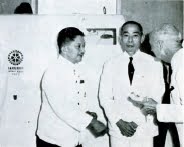
Two iron lungs–one large enough to hold both doctor and patient–is being presented here to the Thailand Red Cross by the Rotary Club of Bangkok. Prince Chumbhot (left), vice-president of the Thai Red Cross thanks the Club for its donation.
The “Uncle Fund” Project: The Uncle Fund put individual Rotarians to sponsor and be in contact with their rehabilitated Leprosy patients (who were treated under the Leprosy Program in the North of Thailand). Through this project, these “Uncles” provided small gifts and kept in touch with these unfortunate people providing them with inspiration and encouragement. Started in 1958, this project continued for several years. Members contributed to the vocational training program for the non-infected boys of leper parents at the Chiangmai Leprosarium.

RCB provided 50 sets of beds and all necessities for the new Patient Ward of the Tuberculosis Hospital in Nonthaburi. At that time, tuberculosis was still a threatening menace to the community. This project at the cost of 100,000 Baht was a highlight of the club’s 25th anniversary in September of 1955.
THE SECOND GENERATION (1960-90): an eye to the Cold War
The Rotary Club of Bangkok continued to engage in service for their communities like the previous generation of Rotarians – in particular through educational scholarships and student loan funds, capacity building for hospitals, and projects supported by preferred Foundations.
New service projects also reflected the current problems and needs of the country during this time. The Cold War period saw the spread of communist insurgency in the North. Many important club projects of this period were therefore related to the hill tribes and the welfare of the under-privileged people in the border areas of Thailand. Their livelihoods were affected by the insurgency and the spreading of communism in the region. Inspired by H.M. the King Rama IX, Royal Patron of Rotary in Thailand, RCB carried out many hill tribe projects with the King’s recommendations and donated funds to support his own projects. A number of these projects spanned several Rotary years.
Communist insurgency and armed conflict in Indochina resulted in many persons being wounded or crippled. RCB contributed substantially to the Foundation for the Welfare of the Crippled as well as initiating their own signature project, the Jaipur Foot for the handicapped.
The year 1968-69 started the Club’s substantial involvement in Hill Tribe projects. RCB’s Gala Fund Raising Dinner on 27 February 1969 raised 680,000 Baht following a stirring speech by H.M. the King on behalf of the Hill Tribes. Over the years the club initiated and supported many projects to help hill tribe refugees (Karen, Yao, Meo, Lahu) who fled the strife-ridden communist controlled areas mainly in the Northern part of Thailand. The projects included both emergency and long-term assistance in providing food, medicines, farm tools, cooking utensils, scholarships for schooling and agricultural training opportunities. In addition RCB invested in schools and infrastructure.
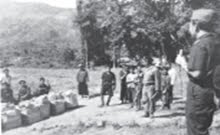
CARE package distribution at Baan Huai Fuong Rotarian Gen. Saiyud speaking on behalf of the Rotary Club of Bangkok
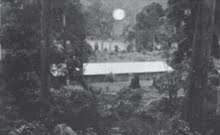
The school at Ban Na Nuen
The year 1966 planted the seed of the “Rotary Bangkok School” at Nong Plub, Prachuap Khiri Khan Province under the Royal patronage of H.R.H. the Princess Mother. Seeing the needs for schooling of the under-privileged children in this remote area, H.R.H the Princess Mother initiated the project with the Club. The fund of 50,000 Baht from Rotary Club of Bangkok was used to build this school on a piece of land donated by a local villager. The construction was supported by the Border Patrol Police. H.R.H. the Princess Mother opened the school in 1969 and named the school after the club name, Rotary Bangkok School (โรงเรียนโรตาร่ีกรุงเทพ). RCB continues to support the school today.

The first building completed in 1969 (inset) The Building was converted to school library in 1992
In the year 1976-77, the Rotary Club of Bangkok started, with a contribution of 200,000 Baht, the signature Ban Nern Din Daeng Project at Thap Sakae District, Prachuap Khiri Khan. Under the Royal blessing of H.M. the King initiated this community development project which involved all 35 rotary clubs then established in Thailand. The object of this extensive community development project was to improve the quality of life for the villagers in every aspect. This was to be done by securing their land tenure, providing basic services, and improving the productivity and marketing of their produce. There was also a need for improvements in educational and health facilities. Thus, in this manner the project lasted for several years, and in 1981 RCB contributed additional funds.

The Rotary Club of Bangkok supported the Khao Kho Peace Building Initiative during 1981 to 1984 with an investment of 780,000 Baht to build a Vocational youth Training Center. The project also provided support to the local villagers for their agricultural development and economic sustainability. Khao Kho had been a long-contested communist insurgency area that had recently been brought under government control. This signature Club project was initiated by Rotarian Gen. Saiyud Kerdphol.

The Jaipur Foot Project was initiated in 1985-86 by RCB Rotarian Z.T. Kajiji in collaboration with the Rotary Club of Bombay downtown, expert technicians from India and Lerdsin Hospital, with the objective to introduce and transfer the know-how for manufacturing artificial legs for the disabled that would be more suitable for Asian conditions and at only one-fifth the cost of the western style artificial legs available. This signature project of the Club proved highly successful and was also adopted by the Rotary District. The Jaipur Foot is one of the items included in the commemorative stamps issued by the Ministry of Communication for the 60th Anniversary of Rotary in Thailand.

Scholarships have been an important area of focus throughout the history of the Rotary Club of Bangkok. No doubt club leaders recognized the importance of a literate and well-educated population contributing to the long-term progress and prosperity of the nation. Since the early beginnings, scholarships and student loan funds have formed an important part of giving. These educational opportunities have provided deserving students the means to earn their degrees in vocational training and various other fields of graduate studies. Over the generations, millions of Baht in club funds have been committed to support students at Schools, Institutes and Universities nationwide. Some of these institutions are Chulalongkorn University, Kasetsart University, Prasarnmit College, Srinakharinwirot University, and Rajamangala Institute of Technology. Educational and scholarship programs have been a yearly activity of the Club under their respective working committees.

Students of Rajamangala Institute of Technology received scholarship at the club meeting
THE THIRD GENERATION (1990-2025): Facing the challenges in an age of the Internet
The story of the Rotary Club of Bangkok continues with a third generation of Rotarians engaged in service. Some of these Rotarians are the family descendants of the previous generation!
Several major natural disasters such as the 2004 Tsunami and the great floods in 2012 needed the attention of Rotary members with a clear question mark on the consequences of global warming. Along with healthcare, projects also focused on clean water, sanitation and environment.
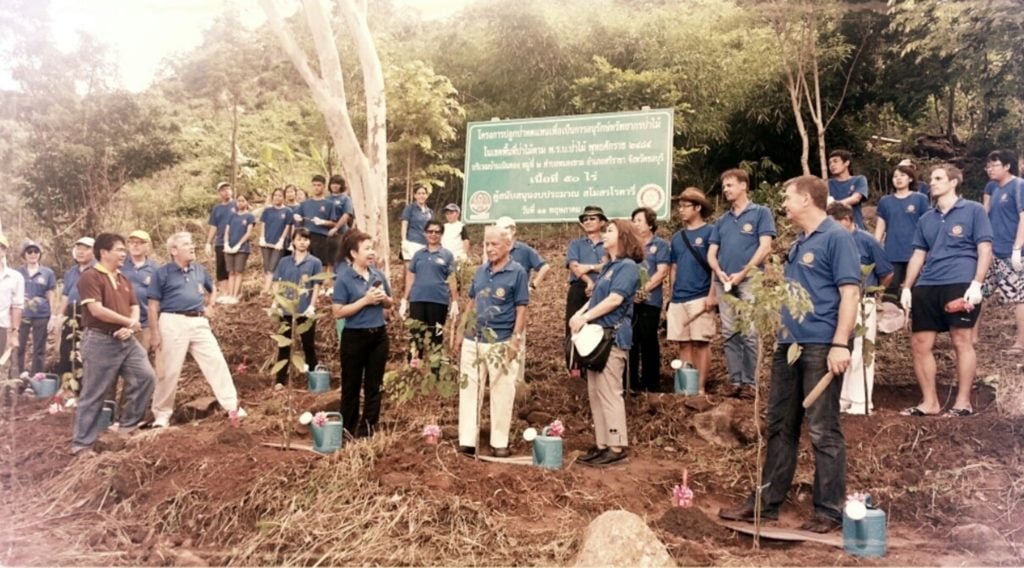
Re-forestation in Sriracha, Chonburi
The focus continued to be on Education and Literacy with new signature projects such as REACT (Rotary Education for AIDS Affected Children in Thailand) to deal with the consequences of a killer disease. The project was one of the pioneering efforts in Thailand to address the needs of children orphaned by AIDS and focused on facilitating the completion of at-least high school level education for this at-risk group of young Thais. Later supported by the Rotary Club of Kowloon East, over 100 such children have completed their schooling in the program.

Rotarians of the Rotary Club of kowloon East with the REACT children
RCB launched the Gift of Smile project in 2002 to commemorate the Club’s 72nd Anniversary. Seven Rotary Clubs from overseas kindly joined in the project. In cooperation with Dr. Narong Nimsakul and the Deja Hospital, the project supported 100 patients to receive reconstructive surgery for their cleft palate or other facial deformities at a cost of 5,000 Baht per operation.
Following the terrible tragedy of the earthquake and Indian ocean Tsunami on 26 December 2004, over 1.2 million Baht in donations were received in the Rotary Club of Bangkok Tsunami Relief fund from around the world. Major rehabilitation projects were carried out in the subsequent Rotary years. Baht 600,000 was used in the Rotary district 3350 Rotary Village project to build homes in Takuapa in Phang-nga Province. Another 170,000 Baht was allocated to the Rotary Cares Project under Past Rotary International President Bhichai Rattakul to build houses for tsunami victims in Krabi Province. Finally, 470,000 Baht was reserved for the club’s joint project with Rotary Club of Calgary and Rotary Club of Las Vegas in partnership with Population and Community Development Association of Khun Meechai Viravaidya. With additional club fund raising, the project invested 2,172,000 Baht in rehabilitation of the communities of Tha Thong Lang and Tha Len villages in Krabi. Named the James Wheeler Davidson “new life after Tsunami” Project, the initiative supported activities in youth development, health and sanitation, environmental education and protection, and vocational income generation at these villages.

Rotary Village Project District 3350
“Honoring the Unsung Heroes” expanded on the early idea of vocational awards for deserving bus drivers who cared for their customers. The Club worked with Ruamduay Chuaykan Community Radio Station to identify nationwide ten “heroic” volunteers each year and recognize their contributions to society by awarding 10,000 Baht each cash rewards and personal insurance policy worth 100,000 Baht supported by Indara Insurance. These are people who have selflessly assisted members of the public in distress. Although much of their brave and benevolent deeds have gone unnoticed, these Unsung Heroes have made a significant contribution to society while risking and sometimes sacrificing their own precious lives in the process.
Retooling Teachers of English from rural schools became another noteworthy project started in 2004. With the world having moved to an age of the internet, English language is a crucial skill for the next generation of Thais learning in school. RCB established a scholarship training program at Thammasat University designed to improve English teaching for teachers from under-privilege schools. Initiated with a fund of 140,000 Baht for 20 scholarships to 20 teachers from various provinces to take a 90-hour tailor-made program designed by Language Institute of Thammasat University (LITU). In subsequent years more corporate partners joined and the program expanded to 84 teachers at a cost of 8,000 Baht per teacher. In 2009, the program extended to Chulalongkorn University Language Institute (CULI) where 40 teachers participated.

RCB initiated the Clean Drinking Water for Schools in Rural Areas project in 2008-09. The Club with partners Rotary Club of Hua Hin, Rotary Club of Osaka, and District 3350 provided 12 clean drinking water filtration sets for 12 schools across Thailand. The Rotary Club of Bangkok’s own contribution was over 300,000 Baht. It is estimated that under the 12 school drinking water projects, as many as 2,411 students and teachers now have access to safe drinking water.
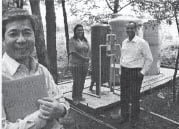
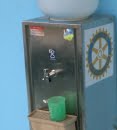
The great floods of 2011-12 hit the central plains of Thailand. Water levels were reported as high as 3 meters with the great mass of water headed directly for the capital city of Bangkok. Many suburbs were under water for over 2 months with a huge loss to property and commerce. The Rotary Club of Bangkok immediately responded with an appeal to members who joined flood relief operations to pack and hand out foods and necessary items to affected households. Separately members donated in kind tons of rice and assorted foods. RCB supported a joint project of Rotary Clubs to help install new clean drinking water systems for 29 affected schools in 8 provinces. In addition, with the generous donations from Japanese Rotarians, the Club installed a new clean drinking water system at Thesaban Bankluay School (2,000 students) and Sapphayawittaya School (1,000 students) in Chainat Province. Also a new clean drinking water system was installed at Wat Daokhanong School in Ayutthaya Province. A renovated the library of Wat Bang Due School in Ayutthaya Province was also completed.

Installed a new clean drinking water system

Rotary Club of Bangkok gave new books to Wat Bang Due School Library on November 2015 (after helping renovation in 2013). The library was badly damaged by the flood in 2011
Special Feature Story: POLIOPLUS turns 35
A highlight throughout the service efforts of the RCB’s third generation of Rotarians has been the participation in each year to support Rotary’s global efforts to eradicate the dreaded disease Polio from the face of the planet. Since the mid-eighties, this has become the signature project for Rotarians worldwide.

Rotary International is joined by the World Health Organization, UNICEF, the U.S. Centers for Disease Control and Prevention, and later the Bill & Melinda Gates Foundation to form the Global Polio Eradication Initiative (GPEI). Rotary and other leading GPEI partners have helped reduce the number of polio cases from 350,000 annually to fewer than 40 by June 2015, with over 2.5 billion children receiving the polio vaccine. As Michael McGovern stated:
“Rotarians have played a key role in bringing the world to the cusp of polio eradication. Their efforts have not only ended polio in 122 countries but they’ve also created a roadmap for the world to tackle myriad other health priorities. This is something all Rotarians can be proud of accomplishing.”
Michael K. McGovern, chair
International Polio Plus Committee
Each year the Rotary Districts partner with their local Public Health officials to carry out free Polio vaccinations in slum communities under the global banner END POLIO NOW. These vaccination days for “PolioPlus” played a pivotal role, not just in making the world polio-free, but laying the groundwork for achieving other global health initiatives. Examples of these immunizing children against measles, distributing insecticide-treated nets to prevent malaria and providing Vitamin A supplements.
The Rotary Club of Bangkok has participated annually in these immunization days in their community. Thailand is now proudly a Polio-free country. Now just two countries are polio- endemic, Afghanistan and Pakistan, where the remaining 1% of polio cases is the most challenging to prevent because the virus persists in the hardest-to-reach areas.
For the past several years, Club members have participated in the Rotary District 3350 Fundraising event “Run to End Polio”.

Educational Scholarships have continued through this generation as a branch of the Club’s service initiatives. In particular, support was provided to the students at Rotary Bangkok School, Rajamangala Institute of Technology and medical students coming from rural areas.
RCB invested substantially in upgrading the infrastructure facilities of their Rotary Bangkok School with a new multi-purpose hall and two new classroom buildings.

Handover Ceremony of the Chalermprakiat Classroom Building

The Multi-Purpose Hall at Rotary Bangkok School
In the last few years RCB has conducted several successful HIV-Home Care based training projects for social workers in the field. In cooperation with experts from Human Development Foundation Mercy Center, the project trained home-care workers and volunteers from 10 NGOs in Thailand. Following the training, Rotarians visited HIV/AIDS patients to assess their quality of living and home care treatment.

In 2020, the Rotary Club of Bangkok responded to the challenges presented by a global pandemic. Club members under the leadership of Rotarian Vasana have immediately responded with emergency relief food supplies to several needy communities. A total of 2064 food shelter boxes have been delivered at a total cost of Baht 777,463. RCB distributed these in 4 provinces through 18 schools, and in 6 needy communities including at Donmuang. All in all, Rotary is a positive force in the world, bringing both local and global benefit to those in need.

